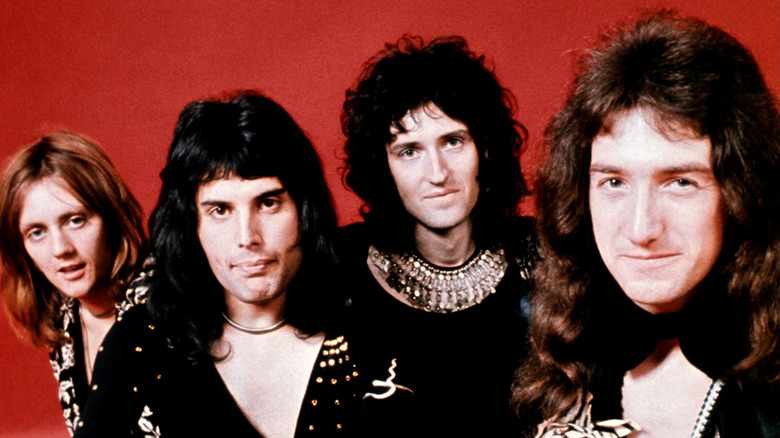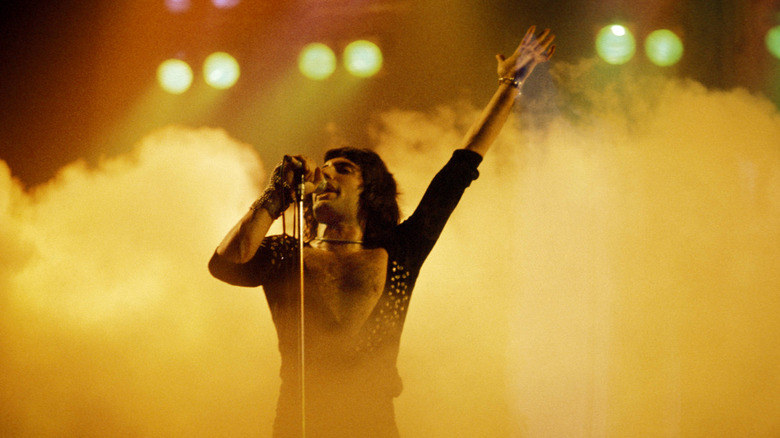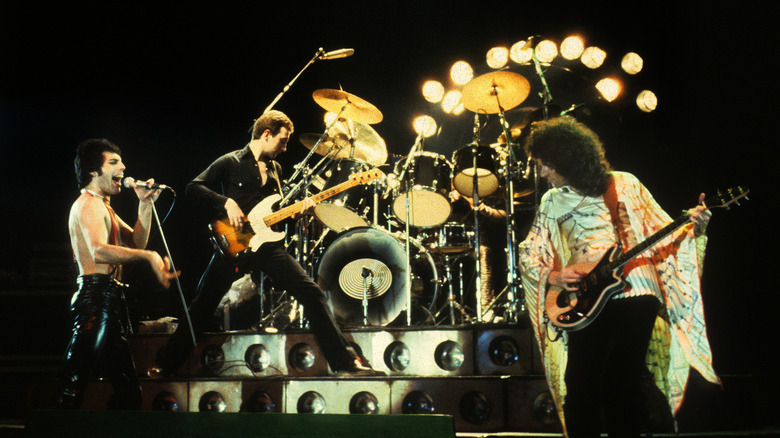The Origin Of Queen's Band Name Explained
Freddie Bulsara had been thinking of a new band name for a while. It was the summer of 1970, and he'd only just joined the band Smile, which then included guitarist Brian May, drummer Roger Taylor, and bassist Mike Grose. Not long afterwards, both the band and Bulsara would get new monikers. Smile would soon become Queen, and Freddie Bulsara (born Farrokh Bulsara) would forever after be known as Freddie Mercury. But Queen wasn't the only choice in potential names and the band members wrangled over what they should call themselves.
Among the other names the band had considered were "The Rich Kids" and "Build Your Own Boat". May and Taylor were pushing for "The Grand Dance," a slightly garbled reference to a C.S. Lewis sci-fi book that includes the phrase "the Great Dance." For Mercury, the name Queen was both regal and a bit risqué (for the time) because of its gay overtones. Besides, Mercury countered, one word band names had more "punch" and were more "memorable," per "Bohemian Rhapsody: The Definitive Biography of Freddie Mercury." He got his way, and although at the band's first gig in Cornwall on June 27, 1970, they were still billed as Smile, they were already going by Queen. It marked the beginning of a rock 'n' roll journey to the top.
Queen sounded regal to Freddie Mercury
Even before Freddie Mercury joined Smile, he'd been toying with the idea of the name Queen since it had such a regal ring to it, but there were other reasons. "It was a strong name, very universal and very immediate; it had a lot of visual potential and was open to all sorts of interpretations," Mercury told Rolling Stone in 1977. "I was certainly aware of the gay connotations, but that was just one facet of it."
Before the rest of the band had even agreed to the name change, Mercury was testing the waters. One day in 1970, he walked up to two sisters he knew, Pat and Sue Johnstone, at a bus stop. "What do you think of the name 'Queen,'" Sue recalled Mercury asking them (via "Somebody to Love: The Life, Death, and Legacy of Freddie Mercury). The sisters thought it was funny because their friend was "always so camp" and they immediately picked up on the term's connection as a derogatory term for gay men at the time. Mercury tried to persuade them otherwise. For Mercury, Queen was more than a name, it was a concept. He'd already begun working on the band's logo and crest, which would eventually include elements of each of the members' zodiac signs.
Brian May and Roger Taylor didn't like the name
As they bandied about potential band monikers, bassist Mike Grose gave his opinion on the name Queen, which he felt was risky. "I said, 'Well, if we didn't get arrested or anything at least people will remember us,'" he recalled in "Somebody to Love." Grose only played three gigs with Queen before leaving (bassist John Deacon joined the band in 1973 and remained until 1997). Grose wasn't necessarily being overly cautious. In England, it had only been three years since being gay was no longer a crime, but there remained some anti-gay laws that were aggressively enforced, along with inequality and discrimination. The other members, Brian May and Roger Taylor, didn't love the name, but eventually gave in, believing the music would define the band, not the name. Also, since they were straight, Queen was ironic. What exactly it meant to Mercury, who at the time was still struggling with his sexuality, is likely more complex.
Although he was to be engaged to a woman, Mary Austin, three years later, Mercury eventually came out to her as bisexual. They never married, but they remained close. Mercury never addressed his sexuality publicly, nor his eventual AIDS diagnosis, until the day before he died of AIDS-related complications in 1991. The name Queen gave Mercury the freedom to be as campy as he wanted and push boundaries, and in turn help to push the genre-bending rock band to the highest heights.


